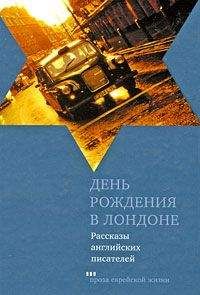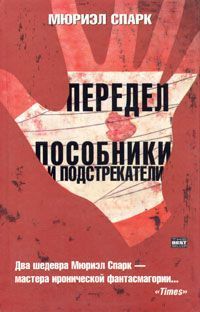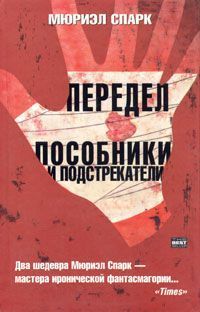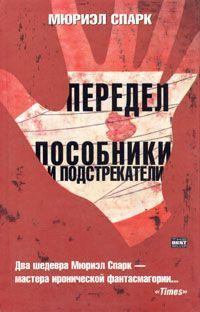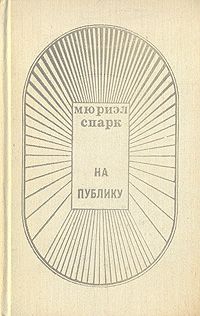Мюриэль Спарк - Английский язык с Мюриэль Спарк (рассказы)
slaughterer ['slO: t(q)rq] aware [q'wεq] thriving ['TraIvIN]
Another led a bullock with a bag tied over its head to a tree and chained it there to await the slaughterers. Frau Lublonitsch did not move but continued to survey her property, her pigs, her pig-women, her chestnut trees, her bean-stalks, her sausages, her sons, her tallgladioli, and — as if she had eyes in the back of her head — she seemed aware, too, of the good thriving guest-house behind her, and the butcher's shop, the draper's shop, and the grocer's.
Just as she turned to attack the day's work (как раз, когда она повернулась, чтобы энергично приступить к своей каждодневной работе: «дневной работе»; toattack— атаковать, нападать, энергично браться за работу), I saw that she glanced at the sorry Hotel Stroh (я увидела, что она бросила взгляд на жалкий Отель Строх; toglance— мельком взглянуть, быстро посмотреть;sorry— огорченный, сожалеющий, несчастный, мрачный) across the path (через тропинку). I saw her mouth turn down at the corners (я увидела, как уголки ее рта опустились; amouth— рот, уста, acorner— угол, закоулок) with the amusement of one who has a certain foreknowledge (с удовольствием/забавой человека, обладающего: «того, кто имеет» определенным предвидением; knowledge— знания); I saw a landowner's recognition (я увидела узнавание землевладельцем /своей будущей собственности/; recognition— узнавание, сознание, признание) in her little black eyes (в ее маленьких черных глазах).
mouth [maVT] foreknowledge [fO:'nOlIG] recognition ["ri: ekqg'nIS(q)n]
Just as she turned to attack the day's work, I saw that she glanced at the sorry Hotel Stroh across the path. I saw her mouth turn down at the comers with the amusement of one who has a certain foreknowledge; I saw a landowner's recognition in her little black eyes.
You could tell (можно было сказать: «вы могли сказать»), even before the local people told you (даже до того, как местные /люди/ рассказали /вам/), that Frau Lublonitsch had built up the whole thing from nothing (что фрау Люблонич выстроила все это из ничего; to build — строить, создавать) by her own wits and industry (своим собственным умом и трудолюбием; wits — ум, разум; industry — промышленность; усердие, прилежание). But she worked pitiably hard (но она работала до ужаса тяжело; pitiably— жалкий, несчастный;pity— жалость). She did all the cooking (она сама готовила: «она делала всю готовку»; cooking— готовка, приготовление пищи, кулинария). She supervised the household (она наблюдала за домашним хозяйством; tosupervise— наблюдать, руководить), and, without moving hurriedly (и, без поспешных движений; hurriedly— торопливо, наспех, кое-как), she sped into the running of the establishment (она преуспела: «набрала скорость» в управлении хозяйством; tospeed— проноситься, пролетать, мчаться;running— беганье, пробег, управление) like the maniac drivers from Vienna (как оголтелые водители из Вены; maniac— маниакальный, помешенный) who tore along the highroad in front of her place (которые проносились по шоссе перед ее поместьем; totear(tore;torn) — разрывать, рвать; нестись стремглав, highroad=highway— скоростная магистраль, автострада).
industry ['IndqstrI] pitiable ['pItIqb(q)l] hurriedly ['hArIdlI]
establishment [I'stxblISment]
You could tell, even before the local people told you, that Frau Lublonitsch had built up the whole thing from nothing by her own wits and industry. But she worked pitiably hard. She did all the cooking. She supervised the household, and, without moving hurriedly, she sped into the running of the establishment like the maniac drivers from Vienna who tore along the highroad in front of her place.
She scoured the huge pans herself (она сама оттирала огромные кастрюли и сковороды; to scour — отчищать, драитьдоблеска; a pan — кастрюля, сковорода), wielding her podgy arm round and round (умело двигая своей пухлой рукой снова и снова по кругу: «рукой кругом и кругом»; to wield — уметьобращаться, владетьинструментом); clearly, she trusted none of the girls to do the job properly (было ясно, она верила, что ни одна из девушек не сможет выполнить работу как надо; to trust — доверять, верить, полагаться; properly — должнымобразом, какследует). She was not above sweeping the floor (она не брезговала: «она не была выше», подметанием пола; to sweep — мести, подметать, подчищать) feeding the pigs (кормлением свиней; to feed — кормить, даватьпищу), and serving in the butcher's shop (обслуживанием посетителей в мясной лавке; to serve — служить, обслуживатьклиентов), where she would patiently hold one after another great sausage (где она терпеливо подносила: «держала» одну за другой большие колбасы; patiently — терпеливо) under her customer's nose for him to smell its quality (к носу клиента, чтобы он смог понюхать ее свежесть: «качество»; to smell — чувствоватьзапах, нюхать, пахнуть). She did not sit down (она не присаживалась), except to take her dinner in the kitchen (кроме как: «за исключением» пообедать в кухне), from her rising at dawn to her retiring at one in the morning (с /того момента, как/ она поднималась с рассветом до ее отхода ко сну в час ночи: «утра»).
scour ['skaVq] wielding [wi: ldIN] retiring [rI'taI(q)rIN]
She scoured the huge pans herself, wielding her podgy arm round and round; clearly, she trusted none of the girls to do the job properly. She was not above sweeping the floor, feeding the pigs, and serving in the butcher's shop, where she would patiently hold one after another great sausage under her customer's nose for him to smell its quality. She did not sit down, except to take her dinner in the kitchen, from her rising at dawn to her retiring at one in the morning.
Why does she do it (почему она это делает), what for (зачем)? Her sons are grown up (ее сыновья выросли, to grow up — вырастать, становитьсявзрослым), she's got her guest-house (у нее есть ее пансион), her servants (ее слуги, a servant — слуга, прислуга), her shops (ее магазины, a shop — лавка, магазин), her pigs (ее свиньи), fields (ее поля), cattle (ее скот) —
At the cafe across the river (в кафе на другом берегу реки: «через реку»), where I went in the late afternoon (куда я отправилась: «пошла» вечером: «поздним днем», late — опоздавший, поздний) they said (говорили): "Frau Lublonitsch has got far more than that (фрау Люблонич владеет: «имеет» гораздо большим, чем все это). She owns all the strip of land up to the mountain (она владеет всей полосой земли до самой горы; a strip — полоса, лента, длинныйиузкийкусок). She's got three farms (у нее три фермы; farm— ферма, хозяйство). She may even expand across the river (она может даже расширить /свои владения/ за: «через» реку; toexpand— расширять, развивать) and down this way to the town (и /вниз/ до сих пор, до самого города; town— город, городок, местечко)."
"Why does she work so hard (почему она работает так упорно: «тяжело»)? She dresses like a peasant (она одевается как крестьянка; todress— одевать(ся), наряжать(ся))" they said (говорили они). "She scours the pots (она драит кастрюли)." Frau Lublonitsch was their favourite subject (фрау Люблонич была их любимой темой для разговоров; favourite— излюбленный, популярный, subject— предмет, тема разговора, сюжет).
expand [Ik'spxnd] peasant ['pez(q)nt] favourite ['feIv(q)rIt]
Why does she do it, what for? Her sons are grown up, she's got her guest-house, her servants, her shops, her pigs, fields, cattle —
At the cafe across the river, where I went in the late afternoon they said. "Frau Lublonitsch has got far more than that. She owns all the strip of land up to the mountain. She's got three farms. She may even expand across the river and down this way to the town."
"Why does she work so hard? She dresses like a peasant," they said. "She scours the pots." Frau Lublonitsch was theirfavouritesubject.
She did not go to church (она не ходила в церковь; church— церковь, храм), she was above church (она была выше церкви; tobeabove— быть выше чего-то, не опускаться до чего-то). I had hoped to see her there (я надеялась увидеть ее там; tohope— надеяться, ожидать), wearing different clothes (одетую в другую одежду; clothes— одежда, платье) and perhaps sitting with the chemist (и, возможно, сидящую с аптекарем; chemist— химик, фармацевт), the dentist (дантистом), and their wives (и их женами) in the second-front row behind the count and his family (во втором переднем ряду, за графом и его семьей; count— граф, неанглийский титул, в Великобритании — earl); or perhaps she might have taken some less noticeable place (или возможно, она могла бы занять менее заметное место; noticeable— приметный, примечательный) among the congregation (среди прихожан). But Frau Lublonitsch was a church unto herself (однако фрау Люблонич, была церковью в себе), and even resembled in shape (и даже напоминала по форме; shape— форма, очертание, облик) the onion-shaped spires of the churches around her (луковки церковных шпилей вокруг нее: «луковичной формы шпили церквей вокруг нее»; onion— лук, луковичное растение, aspire— острие, шпиль, макушка).
church [Cq: C] chemist ['kemIst] congregation ["kONgrI'geIS(q)n]
She did not go to church, she was above church. I had hoped to see her there, wearing different clothes and perhaps sitting with the chemist, the dentist, and their wives in the second-front row behind the count and his family; or perhaps she might have taken some less noticeable place among the congregation. But Frau Lublonitsch was a church unto herself, and even resembled in shape the onion-shaped spires of the churches around her.
I climbed the lower slopes of the mountains (я взбиралась /только на/ нижние склоны гор; slope — уклон, склон, откос) while the experts in their boots (в то время, как профессионалы: «эксперты» в своих /альпинистских/ ботинках) did the things earnestly up on the sheer crags above the clouds (забирались усердно на отвесные скалы над облаками; earnestly — серьезно, важно, убежденно, a cloud — облако, туча). When it rained (когда шел дождь; to rain — идти, литьсяодожде), they came back and reported (они возвращались и сообщали; to report — сообщать, рассказывать), "Tito is sending the bad weather (Тито шлет плохую погоду; weather — погода, буря, непогода, Josip Broz Tito /ИосифБрозТито/ —президентЮгославиив1953-1980 гг.)." The maids were bored with the joke (служанкам надоела эта шутка; joke — анекдот, шутка, острота; to bore — надоедать, скучать), but they obliged with smiles every time (но они вынужденно улыбались каждый раз; to oblige — делатьодолжение, оказыватьуслугу, smile — улыбка), and served them up along with the interminable veal (и вновь подавали им вечную: «бесконечную» телятину; veal — телятина).
